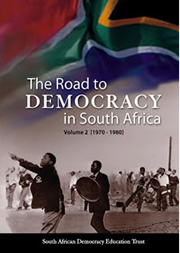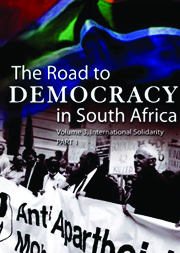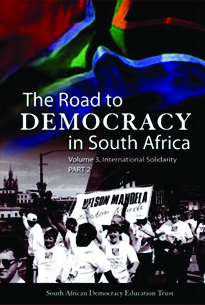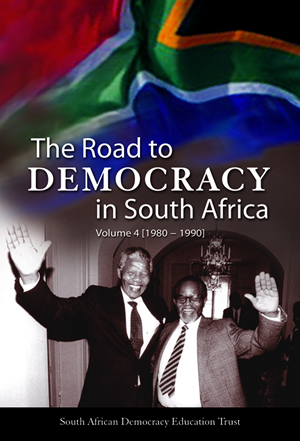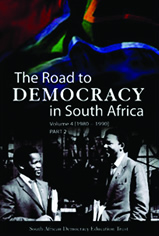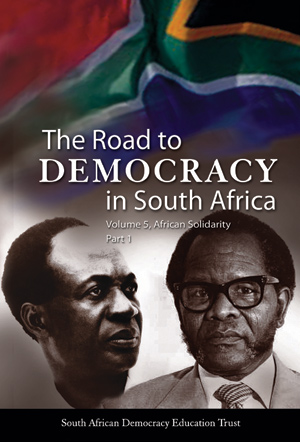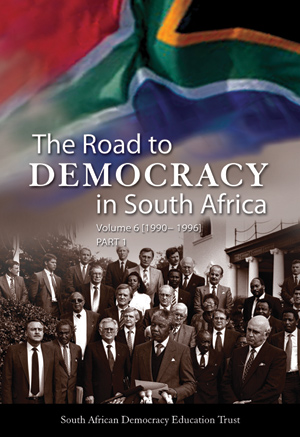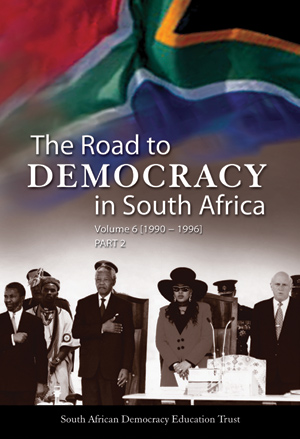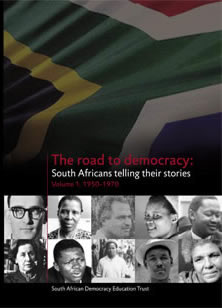The Road to Democracy in South Africa, Volume 1, 1960-1970
TABLE OF CONTENTS
FOREWORD - By President Thabo Mbeki
PREFACE
CHAPTER 1: INTRODUCTION: THE POLITICAL CONTEXT ![]()
By Bernard Magubane
CHAPTER 2: THE TURN TO ARMED STRUGGLE![]()
By Bernard Magubane, Philip Bonner, Jabulani Sithole, Peter Delius,
Janet Cherry, Pat Gibbs and Thozama April
CHAPTER 3: PEASANT' STRUGGLES OF THE 1950's: GAMATLALA AND ZEERUST
By Siphamandla Zondi
CHAPTER 4: RURAL RESISTANCE IN MPONDOLAND AND THEMBULAND: 1960
- 1963
by Sukude Matoti and Lungisile Ntsebeza
CHAPTER 5: THE NATIONAL COMMITTEE OF LIBERATION (NCL)/AFRICAN RESISTANCE
MOVEMENT (ARM)
By Magnus Gunther
CHAPTER 6: THE PAC's WAR AGAINST THE STATE, 1960-1963
By Brown Maaba
CHAPTER 7: THE PAC AND POQO IN PRETORIA, 1958-1964
by Sello Mathabatha
CHAPTER 8: 'LAND AND LIBERTY!': THE AFRICAN PEOPLES' DEMOCRATIC
UNION OF SOUTHERN AFRICA DURING THE 1960S
By Robin Kayser and Mohamed Adhikari
CHAPTER 9: STATE REPRESSION IN THE 1960s
By Madeleine Fullard
Chapter 10: POLITICAL IMPRISONMENT AND RESISTANCE IN SOUTH AFRICA:
THE CASE OF ROBBEN ISLAND, 1960-1970
By Noel Solani and Noor Nieftagodien
CHAPTER 11: THE ANC IN EXILE: 1960-1970
By Sifiso Ndlovu
CHAPTER 12: THE WANKIE AND SIPOLILO CAMPAIGNS ![]()
By Rendani Moses Ralinala, Jabulani Sithole, Gregory Houston and
Bernard Magubane
CHAPTER 13: THE ANC AND THE WORLD, 1960-1970 ![]()
By Sifiso Ndlovu
CHAPTER 14: THE MOROGORO CONFERENCE: A MOMENT OF SELF-REFLECTION ![]()
By Nhlanhla Ndebele and Noor Nieftagodien
CHAPTER 15: THE POST-RIVONIA ANC/SACP UNDERGROUND
By Gregory Houston
CHAPTER 16: ABOVE-GROUND ACTIVITY IN THE 1960s
By Martin Legassick and Christopher Saunders
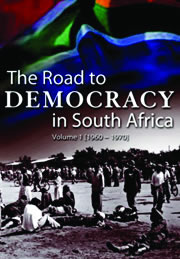 The Sharpeville massacre of 21 March 1960 was a decisive turning
point in South Africa's history. It marked the climax of a decade
of mounting, non-violent resistance to apartheid centred among the
black majority of the country's inhabitants. Sixty-nine defenceless
anti-pass demonstrators were killed on that day, mainly shot in
the back; 186 were injured. It also signalled the opening of a much
more brutal and intensive phase of state repression which would,
in the space of a few years, largely crush internal resistance.
Immediately following that eventful day tension and conflict between
the apartheid state and the liberation organisations rose sharply.
The state introduced a battery of draconian measures: the African
National Congress (ANC) and Pan Africanist Congress (PAC) were banned,
a national state of emergency was declared and security laws and
institutions were extended and reinforced. The ANC and PAC for their
part called at first for mass action. Later they reconstituted themselves
as underground movements and finally launched their respective armed
wings (Umkhonto we Sizwe - MK - and Poqo) who embarked on various
forms of armed resistance. This period of increasingly violent struggle
was brought to a halt with the detention and imprisonment of hundreds
of resisters, most famously the Rivonia trialists.
The Sharpeville massacre of 21 March 1960 was a decisive turning
point in South Africa's history. It marked the climax of a decade
of mounting, non-violent resistance to apartheid centred among the
black majority of the country's inhabitants. Sixty-nine defenceless
anti-pass demonstrators were killed on that day, mainly shot in
the back; 186 were injured. It also signalled the opening of a much
more brutal and intensive phase of state repression which would,
in the space of a few years, largely crush internal resistance.
Immediately following that eventful day tension and conflict between
the apartheid state and the liberation organisations rose sharply.
The state introduced a battery of draconian measures: the African
National Congress (ANC) and Pan Africanist Congress (PAC) were banned,
a national state of emergency was declared and security laws and
institutions were extended and reinforced. The ANC and PAC for their
part called at first for mass action. Later they reconstituted themselves
as underground movements and finally launched their respective armed
wings (Umkhonto we Sizwe - MK - and Poqo) who embarked on various
forms of armed resistance. This period of increasingly violent struggle
was brought to a halt with the detention and imprisonment of hundreds
of resisters, most famously the Rivonia trialists.
The state's violent reaction to the anti-apartheid movement, including numerous deaths in detention and the banning of countless individuals, forced many of those who remained actively engaged in the battle against apartheid into exile. The cumulative effect of these measures was the shattering of the internal liberation movements and the restoration of 'stability'. What followed these tumultuous events was the consolidation of apartheid: the repressive state apparatus was enormously expanded and the economy experienced an unprecedented boom that benefited mainly the minority white population. The 1960s have accordingly been described as the 'golden decade' of apartheid. That golden age was, however, only the privileged experience of a racial minority; for the majority of oppressed black people it was a 'dark decade' of unprecedented repression.
This book provides new insights into the operation of the liberation movements during the 1960s. This it does by drawing on previously untapped documentary sources such as trial records, state archives, and the archives of the liberation movements themselves. More important, however, it includes the voices and experiences of scores of liberation veterans, who courageously and selflessly fought the apartheid regime in the 1960s; and who paid heavily for this either through lengthy jail sentences, exile, or a combination of both. Their life experiences have been recorded by a team of researchers working for the South African Democracy Education Trust (SADET) in different parts of the country whose labours have yielded an incomparably rich archive of taped personal testimonies. This is SADET's particular legacy to the future.
The study also challenges the notion that the 1960s was simply a decade of political quiescence. When compared to the mass defiance campaigns of the 1950s or the revolutionary upheavals that followed the Soweto uprising in 1976, the period under discussion certainly represented a low point in the history of the liberation struggle. However, as the various chapters in this book demonstrate, not even the intense repression of the 1960s by the state could crush the spirit of resistance. Impressive numbers of men and women refused to bow down to this yoke of oppression and contributed hugely to the ultimate destruction of apartheid.
Excerpts
"The conflict between mainly white communists and anti-communists - despite their agreement at the horror of apartheid - constituted an unnecessary division in the movement for liberation. In fact, by the end of the 1960s this issue had largely disappeared. In South Africa itself, the lines between liberals and communists became blurred, as liberals participated in violence, and communists upheld democratic rights. The war against the Vietnamese people waged by the United States began to refocus attention, particularly among the youth, away from 'East-West' issues to 'North-South' issues. By 1970 the ground had been prepared, at least among white South African students, for the emergence not merely of pro-liberation movement but of (democratic) neo-Marxist ideas."
"Some exceptional individuals carried on the work of other Congress organisations within the country, such as Fatima Meer that of the NIC [Natal Indian Congress] and Helen Joseph that of COD [Congress of Democrats]. Joseph, who was elected National Vice-President of COD before it was banned in September 1962, became the first person to be put under house arrest, in part for having travelled around the country to visit banished people, about whom she published a book in 1966. But even while banned and house-arrested she retained contacts with others in the Congress movement."
"There was an uneven anti-communism in the Liberal Party. One of its leading African members, Jordan Ngubane, matched Duncan in his opposition: communism's basic weakness, he wrote, was that it 'elevated dogma into a prison of the mind'; the ANC spoke for the majority but had been 'demoted to the status of a minority organisation' by the communists in the Congress Alliance who were the 'enemy of African nationalism' and 'sabotaged the African's road to freedom'. Others, like Alan Paton and Dot Cleminshaw were far more tolerant of the communists. In the 1960s many younger party members urged a social democratic welfare-state program, and this was adopted in 1964."
"Mrs Suzman played an active role inside and outside Parliament,
and in this continued the tradition of the 'Natives Representatives'.
Her origins were in the upwardly mobile Jewish petty-bourgeoisie
as it entered manufacturing to assimilate with the South African
English, and her appeal lay in the wealthy suburbs of white English-speaking
South Africa. She was part of a class and generation that had anticipated
the steady liberalisation of race relations as a result of economic
growth and education, and stood aghast at the 1948 victory of the
NP, and even more at the 1960s confrontation of white terror and
black 'terrorism' and at the demented fervour with which racial
separation was being pursued. Her criticism was conducted with the
discreet charm of the bourgeoisie, calling for the game to be played
according to the rules."
Some accounts were originally narrated in African languages and translated into English, the working language of volume 1. Subsequent volumes will carry accounts in the original languages in which they were told. We trust, however, the books will appeal to the reading world as books that are truly about South Africans from all walks of life telling their stories, with due regard paid to inclusiveness. The full interview tapes can be consulted, on request, from SADET archives. Contact us.
ABRIDGED COVER
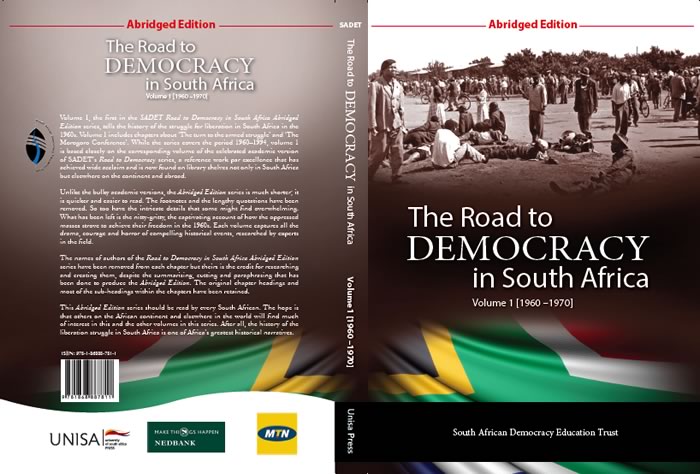
About Us | Road to Democracy | Gallery | Sponsers | Contact | Interviews | Home
© 2015 SADET - All Rights Reserved


